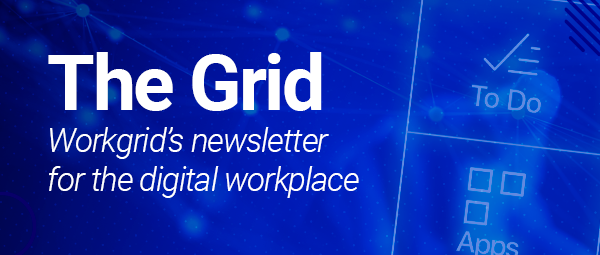Transforming the IT Experience with Next-Generation Technology
Revolutionize the IT experience by leveraging cutting-edge technologies such as artificial intelligence, machine learning, and integrations with business systems like ServiceNow and Jira. Through a conversational interface, an AI Assistant for work maximizes efficiency and provides employees with the support they need.
While there is quite a variety of AI Assistants on the market, not all behave as system agnostic AI-solutions. While being tied to a specific business ecosystem may benefit select employees, Workgrid’s AI Assistant gives IT teams the ability to implement use cases across a variety of business applications and team needs. Here are a few examples:
1. Ticket Management
Enable employees to interact through chat to solve technical issues or raise tickets, making the process more convenient and streamlined. With an AI Assistant employees can receive immediate support, eliminating the need to search for answers and wait for a response. The AI Assistant allows employees to create tickets directly, monitor the status of their tickets, provide comments, and receive notifications when their attention is required. This not only enhances convenience but also improves overall productivity.
![[gif] operational-submit-ticket-vpn-issue](http://images.ctfassets.net/z7p73u8c0thn/2Zg7wEKXBfbmTnouXbVsQS/3d5105704f2f6b2aeb04f1f354a88b35/operational-submit-ticket-vpn-issue.gif)
2. Proactive Assistance
AI Assistants go beyond simply providing answers, they also have the gift of anticipation, providing relevant information when it requires employees’ attention. In the case of IT, there are various use cases where AI Assistants can help streamline workflows and improve processes. From password expiration reminders to upcoming laptop warranty notifications, these proactive nudges help employees take action.
An AI Assistant can also help proactively monitor and diagnose common IT issues (e.g., network connectivity problems) and offer real-time advice to fix IT issues before they disrupt employee productivity. By integrating with IT diagnostic systems and tools, the assistant can alert employees when they may need to run an update or system cleanup within the flow of work.
![[gif] nexthink-free-up-space](http://images.ctfassets.net/z7p73u8c0thn/366SwRKb9GBkvtvwJHaxH0/339a7e9bfd227d3a0d541c8cfe7dae28/nexthink-slow-free-up-space.gif)
3. IT Communications
An AI Assistant can significantly enhance IT communications to employees by providing timely, relevant, and personalized information all in one unified experience. Here are a few examples:
Incident Updates: Notify employees about ongoing IT issues such as system outages or maintenance and provide updates on resolution statuses.
Security Alerts: Alert employees about security incidents such as phishing attempts or data breaches, and provide proactive guidance on steps to take.
Targeted Messages: Send personalized messages based on an employee's role, department, or specific technology needs, ensuring that the information is relevant and timely.
Training Notifications: Help employees stay up to date with continuous learning, training, IT security practices, or new tools and software updates.
By leveraging an AI Assistant for IT communications, organizations can ensure critical and helpful information is delivered accurately and promptly.
![[gif] jira-notification-comment-added](http://images.ctfassets.net/z7p73u8c0thn/6WLj69IzbNGzC7JfVYimfw/5eb53ee661aa1a4a86d7be5c49dba9d0/assess-jira-notification-comment-added.gif)
4. Information Management
Provide employees with one place to go to find the answers they need across systems, documents, and knowledge bases. AI and Machine Learning interpret employee queries and find the most relevant responses, reducing support burdens on IT teams.
Employees can utilize the AI Assistant to ask questions such as "How do I connect to the VPN?" or "Where can I update the email distribution list?" This quick and easy access to answers benefits both employees and IT teams. It leads to fewer incident ticket submissions, accelerated response and resolution times for employee inquiries, and more time for IT teams to focus on high-value tasks.
![[gif] chat-to-servicenow-knowledge](http://images.ctfassets.net/z7p73u8c0thn/2TIFHUbteC2gP3gJg9q8Tg/ce22e479a122cc00335dbb5ce61d64aa/chat-to-servicenow-knowledge.gif)
5. Streamline IT Service Requests
IT support often involves a significant number of repetitive tasks. These tasks, while essential, can be time-consuming and monotonous for IT staff. AI Assistants offer a solution by seamlessly connecting to IT systems, enabling employees to have their requests fulfilled immediately instead of submitting tickets and waiting for hours or days for minor but important requests.
For instance, an AI Assistant can support procurement, such as ordering a new laptop. The process is streamlined and requests are automatically routed to the appropriate individual for approval and fulfillment.
Additionally, AI Assistants can handle a wide range of other IT requests, such as provisioning software, updating email distribution lists, and resetting passwords. By leveraging AI technology, IT support can become more efficient and responsive, freeing up valuable time for IT staff to focus on more complex tasks.
![[gif] service-now-catalog-mouse-order](http://downloads.ctfassets.net/z7p73u8c0thn/4uP2KihBMtwKKvHgxBHib9/51c758c6d57243dca19d43874d742667/gif-servicenow-catalog-735x650.gif)
More Than Just IT
Workgrid’s AI Assistant has the unique ability to bring value across departments, roles, and responsibilities. With this powerful solution, businesses can deliver results to teams across the organization including the following examples:
Centralized Communications
Creating a single location for important business communications, from internal initiatives to operational processes, delivered to the right audiences at the right time. Elevating important communications out of email, helping employees consume the important content they need to know.
Content Generation
Bring generative AI to the employees in a controlled environment – reducing the risk of shadow AI and helping employees understand how to leverage this powerful technology. Built in guardrails help ensure outputs remain professional while giving teams the ability to generate business content such as email or blog copy, summarized content insights, and editing existing content.
![[gif] active-content-genie-example](http://images.ctfassets.net/z7p73u8c0thn/5rQiOyOGL9CHuwH9ymhRt6/334bec9364345f7dedd1067855d935a5/active-content-genie-example.gif)
Time Management
Simplify processes and help employees manage their time with features to help remind, plan, track, and check timesheet and time off balances. An AI Assistant connects employees to time management systems without having to login, enabling users to initiate experiences with conversational AI prompts such as “what is my time off balance?”
Talent & Development
Enhance employee engagement and ensure employees stay up to date on required trainings, onboarding, performance reviews, internal job postings, and more. Automate reminders and reduce digital friction by centralizing workflows through an Assistant and proactively nudging employees when something needs their attention.
Procurement
Manage expenses and purchase orders through conversational AI. Employees can leverage the assistant to surface purchase order and expense policies, view and complete outstanding approvals, check the status of pending orders, and more. Managers and employees alike can benefit from direct access to system tasks and information through the Assistant so they can quickly find what they are looking for and move on to the next task.
Frequently Asked Questions
Employees need to find information – whether they work in corporate offices or on the sales floor. AI Assistant’s support knowledge retrieval by accessing information across business applications, documents, and systems. Featuring robust intent understanding, exception handling, and contextualized answers, answering employee questions through an AI Assistant can benefit the entire organization.
![[gif] ask-when-is-open-enrollment](http://images.ctfassets.net/z7p73u8c0thn/UuSDATeJdfcbrKcECcZ1T/3ced0594523d35ea5025bb899c69948d/ask-when-is-open-enrollment.gif)
Ready to see how an AI Assistant can transform your employee experience? Schedule a personalized demo today to get started.




